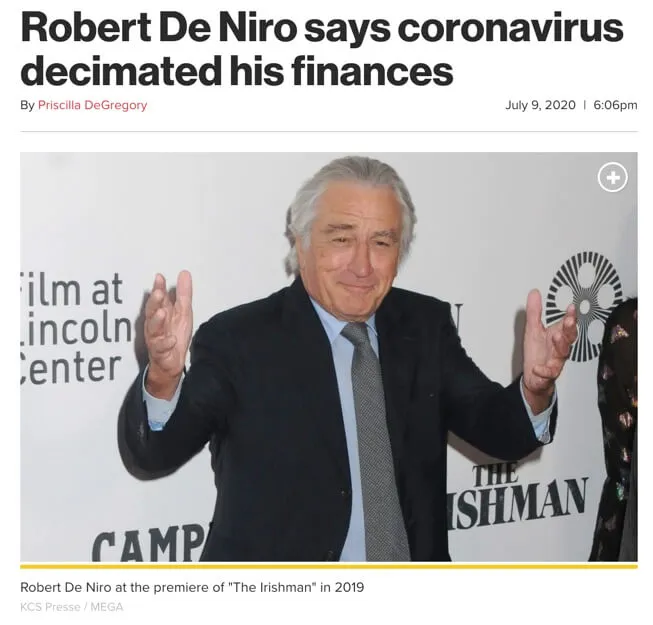
Retirement planning lessons for expats from Robert de Niro
According to an article in the magazine Page 6, even Robert de Niro’s finances have been affected by COVID19.

The issue is his stake in the restaurant and hotel chain Nobu.
Obviously, their venues have been closed or partially closed for months with barely any business coming in.
This has dealt a big blow to his finances.
According to his lawyer, Caroline Krauss, Nobu lost $3 million in April and another $1.87 million in May.
He was also due to pay $500,000 to investors, which he needed to borrow from his business partners, “because he [didn’t] have the cash,”
As a result, he has had to cut the monthly limit on his estranged wife’s Amex card from $100,000 to $50,000. How will she cope?
However, you needn’t worry about seeing him selling the Big Issue any time soon. He is still said to be worth $500 million and expects to earn $7.5 million this year.
In reality, this is a liquidity issue and is something that we can all take some lessons from.
Retirement lessons from the Godfather
Have an emergency fund
Businesses fail. Jobs don’t work out the way you hoped. Investments can go awry. Life tends to get in the way of even the best-laid financial plans.
I normally recommend that clients who are still working keep at least six months worth of expenses on deposit in the bank.
I know this means that your return on this money will be negligible. As I am writing this, Barclays have just cut the rate on their deposit account to 0.01 per cent.
However, by doing so, you can at least be certain that the money will be there when you really need it and you won’t run the risk of having less than you originally invested.
If you have retired already, or are very close to it, and are living from investment income, I would recommend having a greater amount available in cash.
That way, if markets do suffer a severe correction, you can live from your cash, while you wait for your investments to recover their value.
Liquidity is essential
Robert de Niro is struggling financially despite being worth $500 million because all of his money is tied up in illiquid investments.
Investment illiquidity can also affect those in retirement. This is largely due to investors being stuck in structures such as offshore bonds or funds that they are unable to get out of, at least without incurring high costs.
The key with any investment is knowing the terms and conditions for getting out of it before getting into it.
Offshore Bonds
I have seen expats unable to access their Pension Commencement Lump Sum when they want to because they have transferred their pension to a QROPS that includes an offshore bond.
These bonds are typically provided by companies like of Old Mutual/Quilter International, Utmost/Generali or Friends Provident.
The problem lies in the fact that there are often penalties to access money from these bonds. The fees often apply during the first 5-10 years of them being set up.
It is poor advice for anyone to be locked into such a structure when they are close to retirement.
Offshore bonds are popular with expats, but are they really suitable?
In theory, offshore investment bonds can be an excellent investment vehicle for British expats.
The reason for this is that they have certain features that make them effective tax planning tools, especially for higher net worth individuals.
These benefits can accrue to those both living and working outside the UK permanently and to those who, at some point in the future, will return.
Caution is needed when it comes to setting up an offshore bond however.
Many international financial advisers will set these bonds up on a commission basis.
The issue with this is that the bond company (Old Mutual/Quilter International, Utmost/Generali, Friends Provident, RL360) will pay a commission to the adviser, up-front on day one, and then nothing thereafter.
As a result, there is no real incentive for the adviser to look after you properly once the bond has been set up and the adviser remunerated.
Fee only
With that in mind, I believe that offshore bonds should only ever be set up on a fee only basis.
This means that your interests and those of your adviser are aligned.
The adviser charges a fee, for ongoing advice, rather than collecting a large upfront commission from when the bond is first set up and as the client you only pay a fee for as long as you continue to be happy with what your adviser is doing for you.
Structured Products
Structured products are often advertised as the ideal vehicle to help you benefit from excellent stock market performance while simultaneously protecting you from bad market performance.
What’s not to like in that?
Well, structured products are complex instruments where the true risks are often not understood by financial advisers, never mind the client.
One of the biggest risks is liquidity, or the lack thereof.
Structured notes rarely trade on the secondary market after they have been issued, which means they can be punishingly illiquid.
If you do need to get your money out for whatever personal reason—or because the market is crashing—your only option for an early exit is to sell to the original issuer and that original issuer will know that you are in a fix.
As a result, it is unlikely that they will give you a good price—assuming they are willing or able to making you an offer at all.
Suspended funds
Finally, there are funds that have been suspended.
The international financial services market place is littered with tragic cases where funds have been suspended.
This happens due to factors ranging from poor investment decisions through to outright fraud.
Off the top of my head, names such as Mansion Student Accommodation, EEA, Axiom Legal Financing, DeVere Strategic Growth, Quadris Environmental Forestry, Premier New Earth and LM come to mind.
Once a fund has been suspended, investors can wait for years before their money is returned. In the majority of cases, even when they do get money back it is a small fraction of the pre-suspension value.
Having a lot of money doesn’t necessarily make you better at managing it
Johnny Depp has made three-quarters of a billion-dollars on his films. However, he basically lives paycheck to paycheck because of his spending habits.
He once admitted, “I’m not a lawyer. I’m not an accountant. I’m not qualified to help my 15-year-old son with his math homework…I’ve always trusted the people around me.”
Wealthy people are just as likely as anyone else to mess up their finances. It doesn’t matter how much money you make if you have more going out than you have coming in.
For sure, earning more will make it easier to become wealthy in theory. However, it doesn’t guarantee financial success. If you can’t prioritize your spending habits, you’ll never be able to save enough to retire on your terms, no matter how much money you earn.

Ross is a qualified Chartered Financial Planner and Pension Transfer Specialist.
He has been a cross-border financial adviser for 25 years and specialises in helping British expats manage their finances with clarity and peace of mind.
If you would like to have a no strings chat with him, please get in touch.

